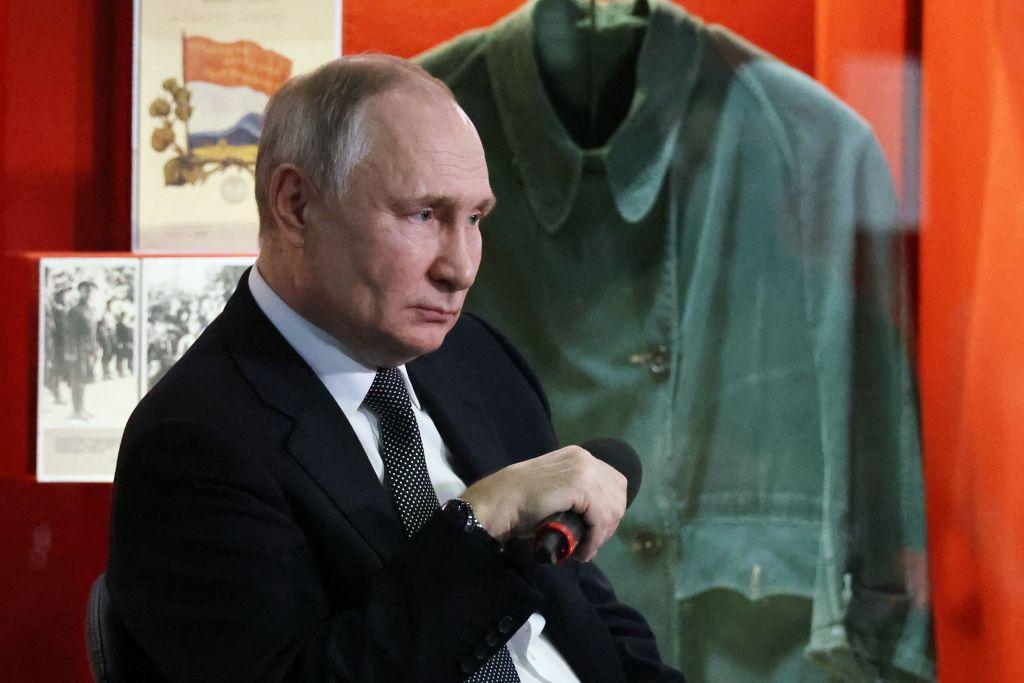
Russian President Vladimir Putin’s address in Volgograd on 2 February, in which he sought to draw moral parallels between the heroic Soviet defence of Stalingrad in World War II and the current Russian invasion of Ukraine, represents a new low for Kremlin propaganda.
First, by asserting that the victory of Stalingrad was a Russian victory, Putin is effectively repudiating the legacy and contributions of the large proportion of the approximately 750,000 Soviet troops that died in the defence of Stalingrad who were not ethnic Russian. The Soviet victory at Stalingrad involved military units drawn from a large number of Soviet national republics and was arguably as much a Ukrainian victory as it was a Russian one.
The Soviet commander of the Stalingrad Front, General Andrey Yeryomenko, was a Ukrainian with an illustrious military career, and ethnic Ukrainians made up a significant proportion of Soviet armies deployed to Stalingrad and other areas of the Eastern Front. While reliable detailed breakdowns by nationality of individual Soviet armies are difficult to locate, figures from the archives of the Soviet Ministry of Defence suggest that, proportionally, the contributions of the Ukrainian Soviet Socialist Republic to the Soviet war effort were actually greater than the Russian republic’s.
For example, the Soviet census of 1939 indicated that Ukrainians made up 16.6% of the population of the Soviet Union. Soviet defence figures for 1944 indicate that Ukrainians made up approximately 22% of Soviet armed forces on two unidentified fronts. In comparison, the Soviet Union’s Russian population in 1939 was approximately 58.4% of the overall population, and ethnic Russians comprised approximated 58.3% of Soviet military forces on the same two fronts in 1944. While these figures represent only part of all Soviet military deployments, they suggest that Ukrainians were actually overrepresented in the Soviet armies that defeated Nazi German forces.
These figures are even more noteworthy when it is considered that for much of the war Ukraine was under the occupation of German forces, limiting the options for conscription. Ukraine also likely suffered a disproportionate number of casualties, both military and civilian, during the war. While actual figures of Soviet casualties across the war remain highly contentious, eminent historian Timothy Snyder has claimed that, in absolute terms, more inhabitants of Ukraine died during World War II than inhabitants of Russia. And others, such as Russian historian Vadim Erlikman, have clearly demonstrated that, proportionally, Ukraine experienced much higher casualties during the war than Russia.
Second, Putin’s continued propagation of the idea that Soviet forces saved Europe from Nazism during World War II also obscures the fact that for the war’s first two years, the Soviet Union was effectively an ally of Nazi Germany. Current Russian historiography and mythmaking appears hellbent of excising the Molotov–Ribbentrop Pact from Russia’s collective memory. But the reality was that Soviet support for Nazi aggression in the period immediately prior to the Nazi invasion of the Soviet Union went much further than just a non-aggression pact. As outlined by historian Edward Ericson in his book Feeding the German eagle: Soviet economic aid to Nazi Germany, 1933–1941, the Soviet Union under Stalin maintained a robust trade relationship with Germany that sustained the Germans’ capacity to conduct offensives in western Europe right up to the date of Germany’s invasion of the Soviet Union in 1941.
Third, while comparisons of Putin’s Russia with Nazi Germany are fraught and not necessarily defensible, the ideology and increasingly genocidal intent of Russia’s ambitions in Ukraine arguably make the current Russian leadership in the Kremlin a modern-day successor to Germany’s Nazi party. Russia’s invasion of Ukraine has given rise to a new term, ‘ruscism’, that signifies Russian ideology as a particular form of fascism. Furthermore, the letter Z, which has emerged as a symbol of Russia’s ‘special military operation’ in Ukraine and a lightning rod for Russian nationalist support for the war, has been associated with the Nazi swastika as a new symbol representing totalitarianism and modern-day fascism.
Putin’s speeches since the start of Russia’s invasion of Ukraine have contributed to the perpetuation of this view, especially as they have been littered with genocidal references foreshadowing the elimination of not only Ukrainian sovereignty but also the Ukrainian people. And, as amply demonstrated by Julia Davis’s Russian Media Monitor, Russian television has been inculcating the broader Russian population with Putin’s genocidal vision for Ukraine, fostering Russian support for the horrors that the Russian military is inflicting on Ukraine.
A concrete manifestation of Russia’s fascist and genocidal ambitions in Ukraine is the widespread deportation or forceable displacement of Ukrainian children from occupied territories to Russia, where they are subjected to the ‘de-Ukrainisation’ of their identity. Any territory annexed by Moscow either through military successes or as a result of a settlement to end the war will likely also be subjected to a deliberate campaign of genocide focused on the eradication of Ukrainian identity.
Putin’s use of Stalingrad as a symbol of Russian greatness and the inevitability of Russian victory in Ukraine fits with his tendency to use mythology and fabricated history to sustain his vision for the future of Russia.
But, ultimately, his choice of Stalingrad is both curious and flawed. Stalingrad represented a triumph of all the nationalities of the Soviet Union, not just of Russians. It also stood as a victory over an overwhelmingly militarily dominant power that had no compunction in leveling cities and exterminating entire populations in pursuit of its imperialist objectives.
In this regard, there are some parallels between the battle of Stalingrad and the current war in Ukraine. But in this case, Russia is playing the role of Nazi Germany, and the Ukrainian people will hopefully emerge victorious from the horrors of the Russian war.